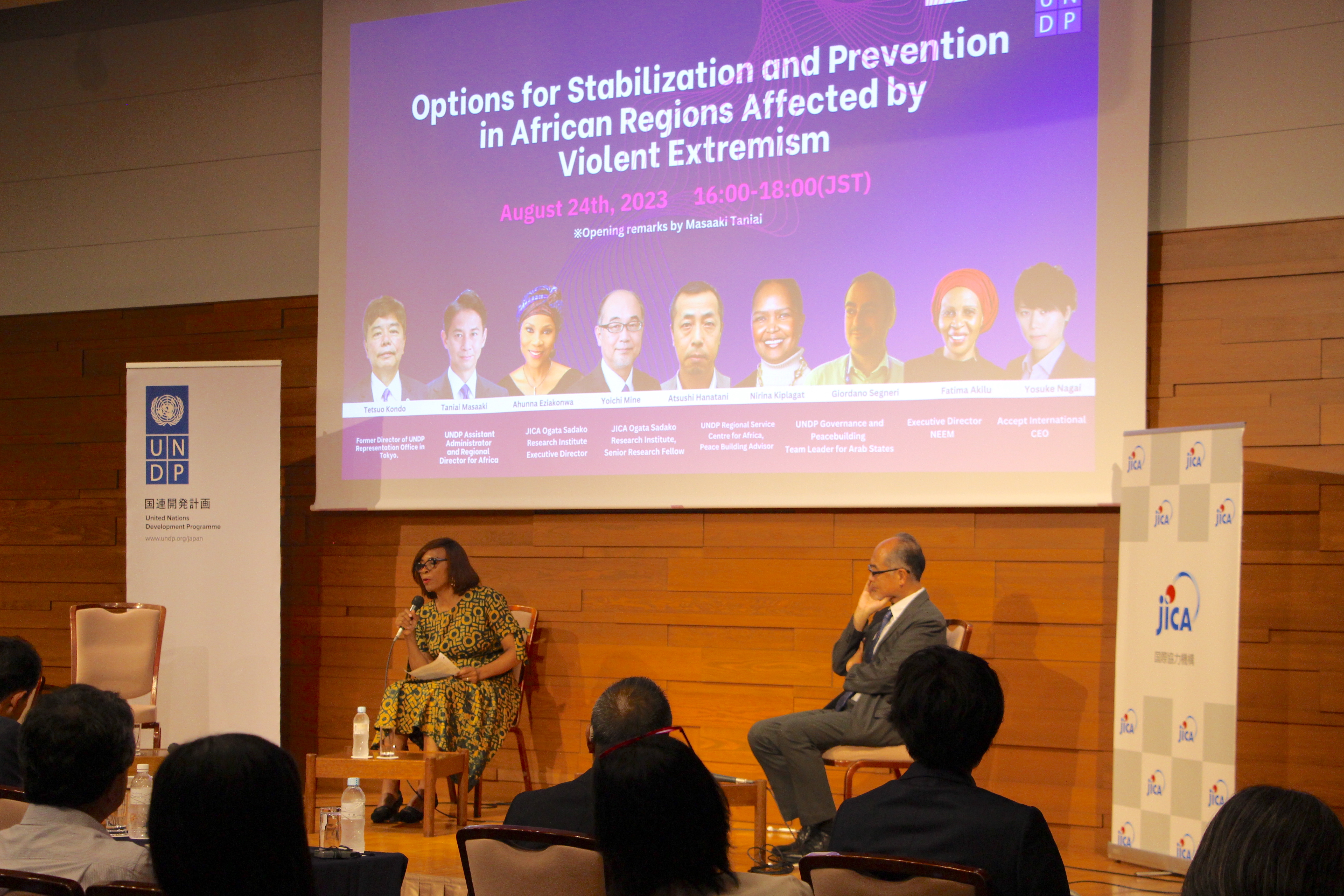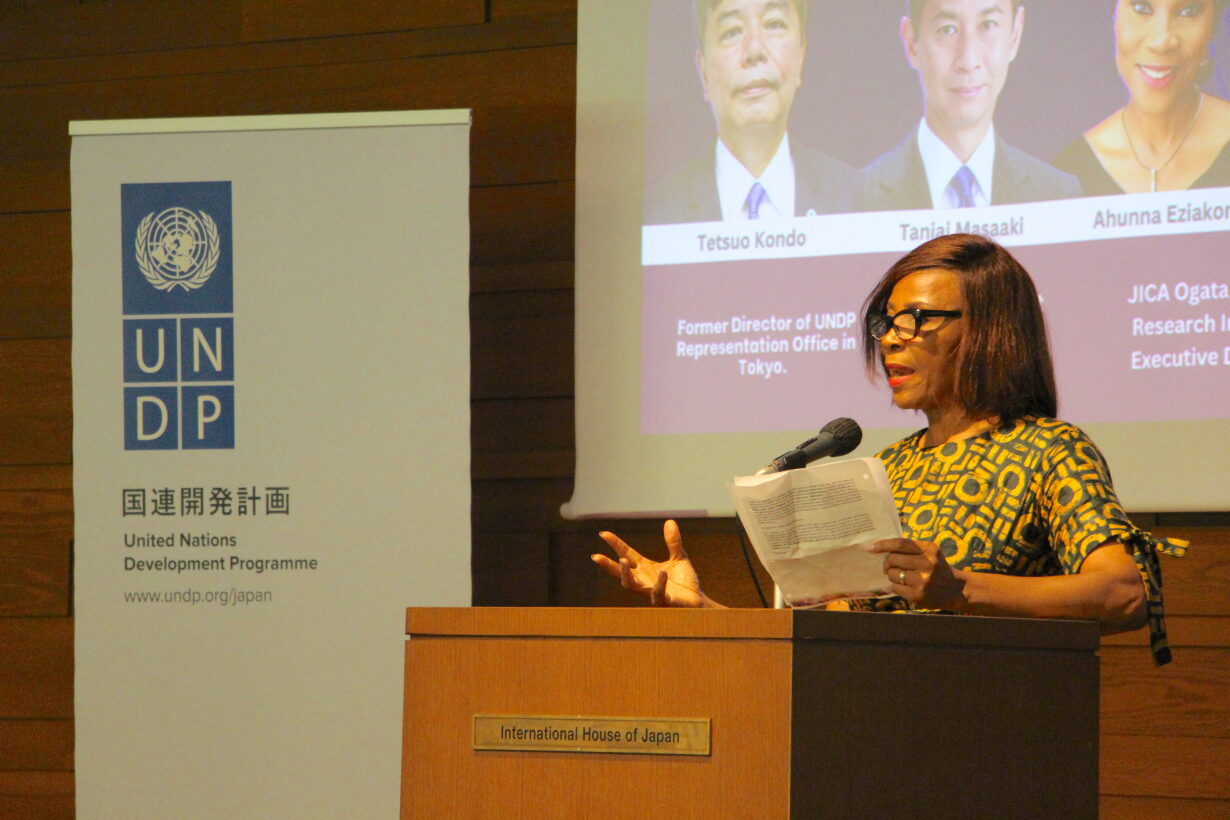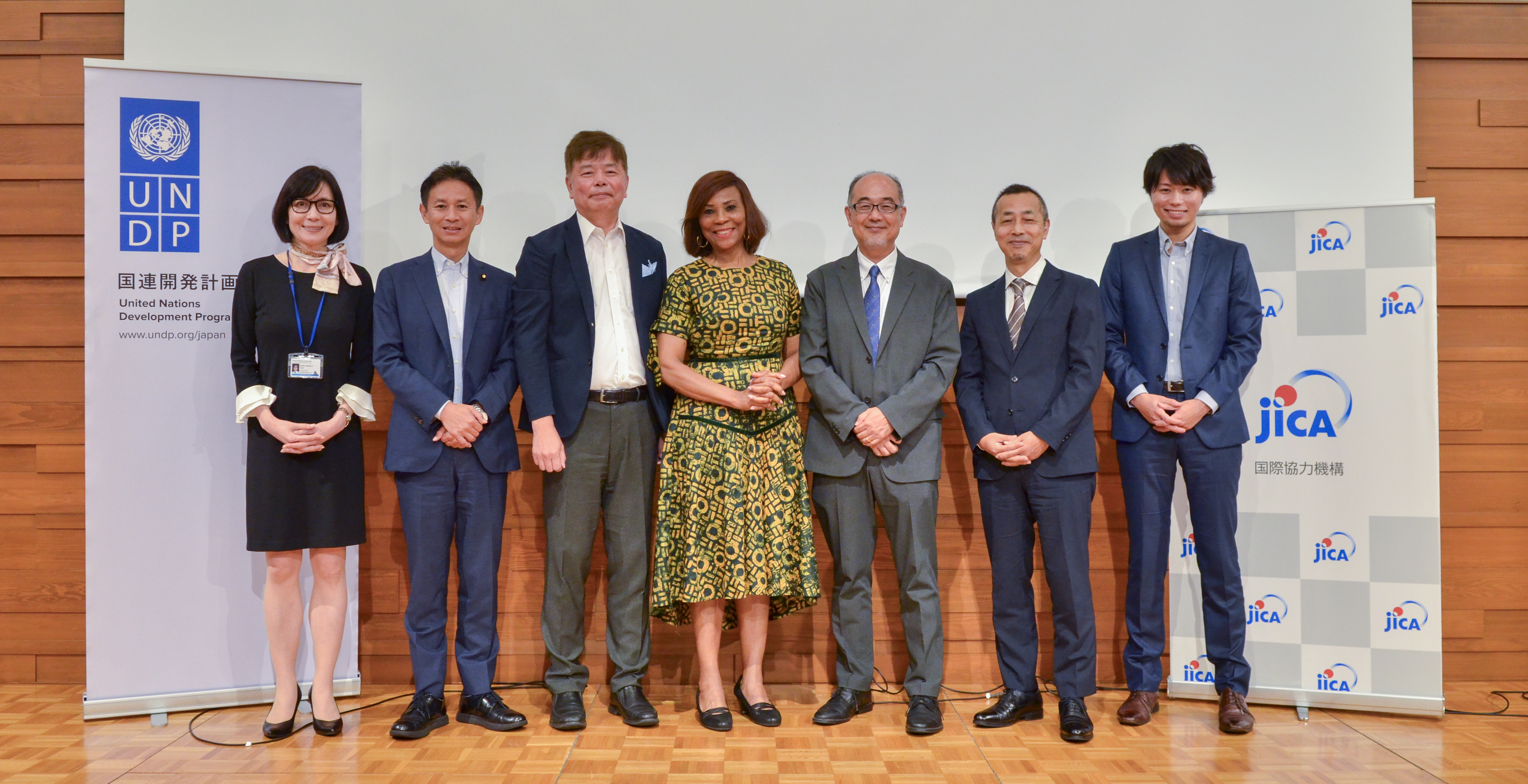In August 2023, JICA Ogata Research Institute and UNDP held a policy dialogue on violent extremism. Key experts and policymakers gathered to focus on sustainable solutions and emphasized collaboration with Japan.
Tackling Africa's growing threat of violent extremism
October 24, 2023

Eziakonwa and Mr. Yoichi Mine during their discussion
The surge of violent extremism in Africa is a pressing and complex challenge that threatens regional peace, security, and development. In 2021, Africa accounted for nearly half of global terrorism deaths, with attacks increasing tenfold in the Sahel region since 2007. The Sahel alone witnessed more terrorism deaths in 2022 than South Asia and the Middle East/North Africa combined, as per the 2023 Global Terrorism Index.
In August 2023, in collaboration with the JICA Research Institute, the United Nations Development Programme (UNDP) organized a specialized policy dialogue, gathering key policymakers and experts to discuss the emerging research on violent extremism and its implications. This event was supported by the Sophia Institute for Human Security.
Moderated by Mr. Tetsuo Kondo, Visiting Professor at Sophia University and former Director of the UNDP Office in Tokyo, the event encouraged discussions on cost-efficient investments and sustainable outcomes. Critical reflections on past efforts were highlighted, with renewed commitments to holistic strategies for countering violent extremism in Africa and the Arab regions.
In the opening remarks at the event, Ahunna Eziakonwa, Assistant Administrator and Director for the Regional Bureau for Africa at UNDP, commended Japan for its unwavering commitment to the Prevention of Violent Extremism (PVE) and its strategic alliance with UNDP, highlighting the critical role of the Tokyo International Conference for African Development (TICAD) in promoting peace and stability.
“In regions such as Mozambique and the Democratic Republic of the Congo (DRC), the primary countermeasure against violent extremism had been military and security interventions. However, investment in preventative strategies was notably lacking. Collaborative efforts to steer away from extremism are vital, ensuring a path marked by stability, growth, and optimism,” stated Eziakonwa.

Eziakonwa captivating the audience with her keynote speech during the event
The need for global collective action was further stressed by Mr. Yoichi Mine, Executive Director of the JICA Ogata Sadako Research Institute for Peace and Development (JICA Ogata Research Institute), who highlighted the situation of the Sahel region as being particularly vulnerable to extremist groups. “Youth are vital assets for development, and initiatives that support their innovation are essential,” stressed Mine.
Mr. Masaaki Taniai, Member of the House of Councillors in the Diet, stressed that poverty, social marginalization, and inadequate public services are catalysts for radicalization. He emphasized Japan's active support for PVE initiatives in Asia and Africa in collaboration with UNDP, demonstrating Japan's unwavering commitment to international partnerships and enhancing peace and prosperity in Africa.
Nirina Kiplagat, Regional Peacebuilding Advisor at the UNDP Regional Service Centre for Africa, presented two studies from the Reports Series on PVE, focusing on recruitment. "Many individuals join extremist groups seeking job opportunities rather than driven by religious ideologies. Moreover, disillusionment with the group's ideology often leads individuals to eventually leave. These extremist groups have evolved as competitors to established states, thriving in insecure and impoverished areas, often benefiting local elites."
Giordano Segneri, Team Leader with the UNDP Regional Hub for Arab States, Governance, and Peacebuilding, stressed the need for a comprehensive approach to preventing violent extremism, encompassing political, peace, and prevention dimensions. He emphasized understanding the complex drivers of extremism and the role of dialogue and national ownership. Segneri also mentioned the UNDP initiative in Somalia, empowering religious leaders through facilitating the integration of individuals from extremist groups while fostering community cohesion and long-term peace.
Dr. Atsushi Hanatani, Senior Research Fellow at the JICA Ogata Sadako Research Institute for Peace and Development, emphasized that the search for protection could often be the primary motivator driving youths to join extremist groups in the absence of government protection and services, which need to be filled by development interventions. He stressed the need to integrate PVE into diverse programs, including those without a direct PVE focus, as PVE programs are often implemented in borderlands with limited populations, limited economic activity, and government presence.
Experience was shared from Somalia and Yemen by Mr. Yosuke Nagai, the Founder and CEO of the Accept International, who highlighted the presence of youth in violent extremist organizations and their potential for disengagement when provided with opportunities. He highlighted the pressing need to support disengagement and reintegration by integrating specific PVE methods into broader, more popular subjects such as youth empowerment or community development.
Ms. Fatima Akilu, Executive Director of the Neem Foundation, emphasized the need to rebuild trust within Nigerian communities through inclusive community committees, which include diverse sectors like women, religious groups, traditional institutions, the disabled, and youth. She also highlighted the importance of integrating the security sector into these committees to promote dialogue and understanding.
Kiplagat then expanded on UNDP's research, citing practical examples from Togo's PVE strategy developed with local committees and Mombasa County's inclusive action plan. She underscored the need for comprehensive analyses and effective outcome measurements in all PVE activities.

Group Photo: (left to right) Hideko Hadzialic, Mr. Masaaki Taniai, Mr. Tetsuo Kondo, Ahunna Eziakonwa, Mr. Yoichi Mine, Mr. Atsushi Hanatani, Mr. Yosuke Nagai

 Locations
Locations



